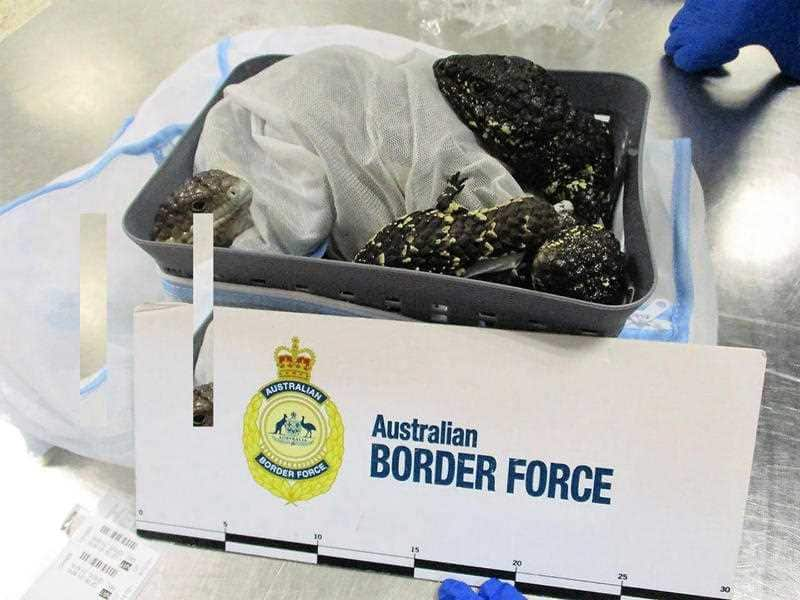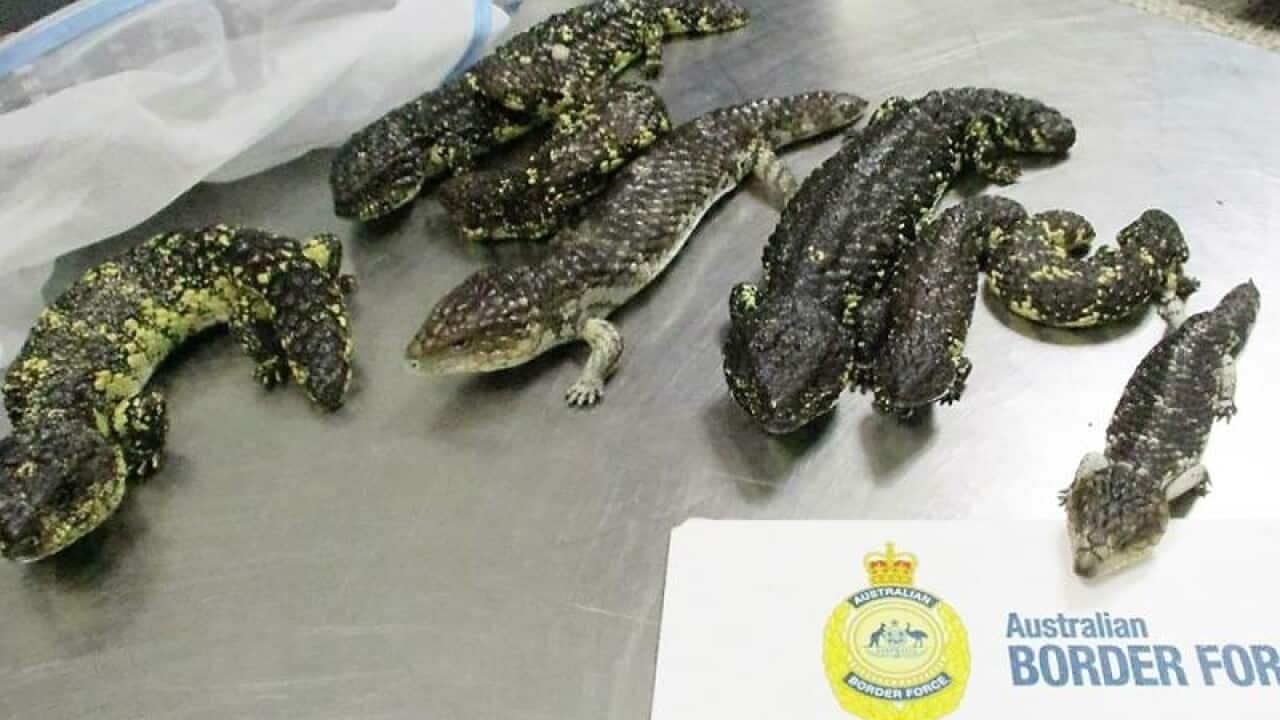Australia is known for being tough at its borders, restricting imports and exports of various products.
In particular, the import and export of animals is heavily controlled, with tough penalties, including a long jail sentence, for those who disobey the law.
A Japanese national is the latest to have fallen victim to the law after she allegedly attempted to smuggle 19 native reptiles out of Australia.
The 27-year-old woman is alleged to have tried to smuggle 17 Shingle Back lizards and two Blue Tongue lizards within two tightly packed mesh packages in her suitcase.
The lizards were taken by A-B-F officers and referred to the Victorian Department of Environment, Land, Water and Planning who are now looking after them - before their eventual return to the wild or another appropriate home.
Australian Border Force Investigations Commander Graeme Grosse says this is just one of many cases of the illegal trade of animals that the ABF tries to disrupt and deter.
The 27-year-old was arrested at Melbourne Airport after an x-ray revealed the 17 shingle back lizards and two blue tongue lizards in mesh packages within her luggage on Tuesday.

"The Australian Border Force has specific memorandums of understanding with various partner agencies internationally, to facilitate the sharing of circumstances such as this. We also work through bodies such as the World Customs organisation and bilateral and multilateral forums, where we agree to work on certain issues and to share information," Mr Grosse said.
The alleged smuggler was heading back to Japan when Australian Border Force officers discovered the lizards after receiving a tip-off from Hong Kong.
Kate Gavens, who is the Chief Conservation Regulator at the Victorian Department of Environment, Land, Water and Planning says that the trade of reptiles can be lucrative and attracts a number of syndicates who work within and outside of Australia.
She says that in this instance, the attempted export could have fetched the syndicate upwards of one-hundred-thousand dollars.
"Reptiles can fetch quite considerable prices overseas in terms of trading. So, we certainly know for example that a Centralian blue-tongued lizard can command up to 8-thousand US dollars in Hong Kong. So these are significant prices that these animals are getting overseas," she said
"They will be checked by a vet and donated to schools and other not-for-profit organisations if they can't be returned to the wild after the finalisation of the legal processes."
Additional wildlife and cruelty charges may also be laid, Ms Gavens said.
This latest detection comes as part of what is alleged to be a wider syndicate.
A 45-year-old Japanese national was arrested at Perth Airport in early November and a 46-year-old Japanese national was arrested at Sydney Airport in early February.
They are both alleged to have smuggled reptiles in a similar manner.
Commander Grosse at the Australian Border Force says syndicates are of particular concern to officials as they often use intricate operations.
"People trying to smuggle Australian wildlife out of the country, they can either do it on an individual, opportunistic basis, or they can do it as part of an organised group where they actually come here to specifically source flora and fauna that is attractive on the overseas market. So one of the syndicates we identified is actually, worked in various states and then they export it out of Melbourne," he said.
The Japanese tourist has been charged under a section of the Environment Protection and Biodiversity Conservation Act of 1999, with the maximum penalty for such offences being 10 years imprisonment or a fine of $210,000.
The could face a similar sentence to that of a Taiwanese national who was sentenced in April to six months jail after he was found to have been trafficking hundreds of Australian reptiles to Hong Kong.
Commander Grosse says the penalties need to be tough as to deter further efforts by these individuals or syndicates.
"So these lizards are protected under our legislation. They require a permit to be exported and in some cases as well, there are state legislation where they require a permit to be moved outside of that state."
Commander Grosse at Border Force says reptiles aren't the only animals targeted by these syndicates.
"Over the last six months, reptiles have been very common. But, look, to be honest, we've found a variety of flora and fauna, including insects, spiders, scorpions, snakes, birds, often concealed in various types of luggage. And we find it through various transit. It can be the international mail stream - where they're sent in packages, it can on passengers departing Australian and it can also be through international cargo shipments."
Ms Gavens said she too she has concerns over the treatment of the animals.
"Often these animals are stuffed into things like socks, they're taped up before being shipped overseas. So these are not good conditions for animals to be transported in and it is illegal," she said.
Both the Australian Border Force and the Department of Environment Land, Water and Planning work together to disrupt and deter the illegal trade of animals, whether they are imported or exported.
But Ms Gavens is calling on everyone within the community to assist in stopping the illegal trade of wildlife.
"I urge any community members who do have information on illegal trade in wildlife to please call Crimestoppers on 1800 333 000. It really helps us to be able to detect and to crack down on this cruel, illegal trade," she said.
Commander Grosse has similar advice.
"When you see people acting suspiciously with attractive wildlife, particularly lizards, birds, that sort of thing and trying to pick them up and take them, we'd encourage you to report those matters and you can report them through the Australian government website at Australia.gov.au/borderwatch and those allegations will be taken seriously," he said.

